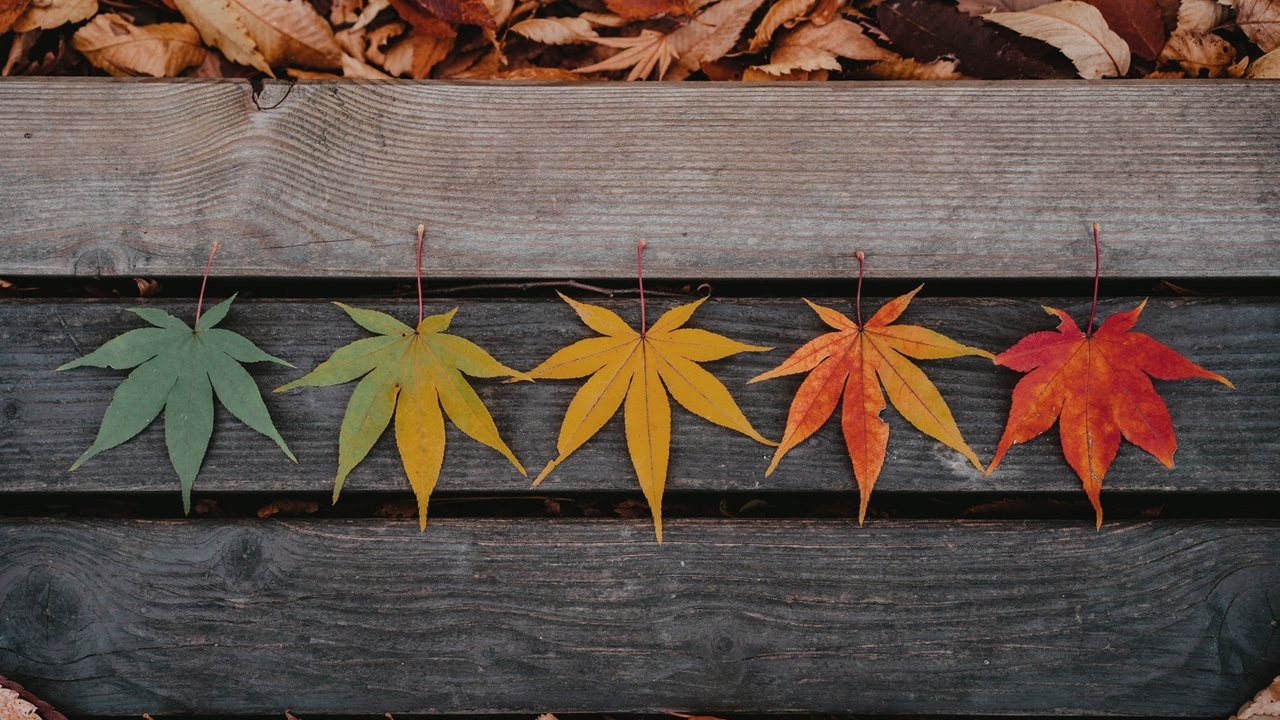
Impermanence: A Mindfulness Concept that can Help in your Journey towards Better Body Image, Mindful Eating and Making Peace with Food
Mar 24, 2022If there's one thing that nature teaches us, it's that no matter what we do, whether we like it or not, winter turns into spring, spring into summer, summer into fall, and inevitably, winter arrives once again.
We see and value change in other areas too, like celebrating that babies become toddlers, and toddlers, grown children, children become teenagers, and eventually adults.
When we look at these examples, there is proper acceptance and understanding of impermanence, aka, the fact that change is part of the reality of life, and that some stages, moments and seasons end, and bring the possibility of a new one to emerge.
This is impermanence in action and it's so easy to see in these examples. Other than wanting our summer holidays to perhaps last a little bit longer, we've accepted that they are a part of life. When it comes to many other areas of our lives, and as it pertains to the topics we discuss at Brownble, it is so much harder to come to terms with impermanence, and just as it is with mindfulness in general, it's important to keep this concept close. It can be so helpful when starting a mindful eating practice, and when healing our relationship with food and making peace with it.
Mindfulness meaning: What is mindfulness?
Just as mindfulness can be briefly explained by the practice of being in our present circumstances fully, with acceptance of what is, noticing what we're doing with kind attention, noticing when instead of being present we've started thinking, and we bring ourselves back to the present moment, impermanence is also about a moment of conscious awareness.
Impermanence meaning: What is impermanence?
Impermanence is a concept used in mindfulness to represent the truth about our reality, which shows that we are in a constant state of flux, that moments in our lives end, that things change, that a new internal process finishes and then something new begins, that even our lives are finite.
In mindfulness, Impermanence is considered one if the three truths or marks of our existence - impermanence, suffering and egolessness -, and even though the words seem scary, and even though most of us fear change, change is at the root of what makes us human.
It's easy to see impermanence in all of nature's cycles, where we don't feel a threat to our existence or an end to a relationship, career, job, friendship, etc., it can be quite scary to look impermanence right in the eye, but within it lie so many lessons and a sense of peace, that in ignoring it or resisting it, we are doing ourselves a huge disservice. 
What feels scary about impermanence
When I first learned about impermanence it brought up feelings I didn't want to be in touch with:
It feels scary to think of the end of a cycle.
It feels scary to think of the death of loved ones and of ourselves.
It feels scary to imagine the loss of a job.
It feels scary to picture the loss of money, the end of a career or a business you loved.
It feels overwhelming to even contemplate the end of a relationship, whether it's a friendship, estrangement with a family member, the end of a romantic relationship.
It feels stressful to think of the end of a work contract.
It feels scary to think of the loss of a particular body size or shape if we've been disordered with food and are now beginning the process of recovery.
It feels scary to picture the loss of youth and the many changes that will occur as we age.
What impermanence also brings:
- An understanding that there is also impermanence in unpleasant experiences, stress and suffering. Just as a season of great financial abundance was impermanent and we might have experienced a stressful change, there is also impermanence in the stress itself, it will pass and we will adjust, or the recession will end and so will the trying times. If we're struggling with an illness, impermanence means that the difficult day at the doctor's office or in treatment, also has impermanence, it will pass. That the day with worsened symptoms will pass. If we're going through a rough patch with a partner, a son, daughter, friend, there is also impermanence and something will eventually shift. Sometimes the shift will come within the dynamic, or in our own way of dealing with the situation.
- An appreciation and even more presence during the precious moments of life (more snuggles with our kids, more present conversations with our partners, more time with our beloved pets, with friends, with family, more paying attention when we're in nature, more doing of the things we love to do, with attention).
- An understanding that impermanence and change can feel uncomfortable but that sometimes it is also the start of a new stage of life that will bring about its own positives, meaning that with an end there is always another beginning.
- A sense of relief from knowing that change is a part of life, that we will all go through it, that resisting it is often what gives us an increased sense of suffering.
- An understanding that certain paths we've gone down before may not be the right ones for us today. That our lives are full of impermanence and change, which is why mindfulness is an important tool. It teaches us to pay attention, to watch our thoughts almost from a vantage point, and see if what we need might have shifted slightly and it's time to make adjustments.
A great quote by Thich Nhat Hanh talks about the fear we have of noticing impermanence as it relates to expectations:
"It is not impermanence that makes us suffer. What makes us suffer is wanting things to be permanent when they are not." - Thich Nhat Hanh

What can we learn from impermanence when it comes to our relationship with food?
When we're on this journey to practice attuned or mindful eating, so many messy feelings come up:
- We have anxiety when eating a previously forbidden food: Rather than trying to act on that anxiety by imposing a new post eating rule or restriction, simply remember that that feeling of anxiety is impermanent. It won't last forever and these moments will get quieter and quieter the more we expose ourselves to them.
- We have strong fears when we have to face social situations with food. Rather than isolating ourselves to prevent these feelings, we notice that the fear has impermanence, that most likely when we sit down at that table, and we're telling stories and sharing food, it will start feeling easier, and the next time will be even easier.
- When we've been restricting for so long, it can feel that when allowing foods we're in a constant state of bingeing, obsessed or even addicted to these foods and this can cause tremendous stress. Rather than self confirm our worst fear, that it is the food itself that is the culprit, we notice that the actual cause has been the black and white thinking, the very rigid restriction of foods we've characterized as off limits. We instead focus on the impermanence of the stress, we can do this even in the impermanence of the feeling of excessive fullness. The food will be digested, and in a few hours, the discomfort will be gone. We will be free to learn from these moments for future reference when being faced with these foods or these fears.
- If we are vegan or vegetarian or have a specific way of eating due to ethical or religious beliefs, and we're facing difficult moments at the table with unsupportive friends and family, we can notice the impermanence, that not all moments at the table will be like this, that through the years people begin to understand, or we begin to isolate people's opinions from the mix and manage the situation better.
- If we are afraid of letting go of restriction and are in recovery from disordered eating, if we are having a lot of fears with foods that are being incorporated back into our diet, we can remember that we're in the thick of it, but we won't always be there, that losing the fear will happen slowly over time and we don't have to act on it. We recognize that these feelings, this particularly hard moment with food has impermanence.
What can we learn from impermanence when it comes to our relationship with our bodies and improving our body image?
There is no better place to talk about impermanence than with our own bodies, especially when it comes to our appearance.
The way our skin looks, the amount of fat we have on our bodies, the tone of our muscles, the size of our waist, of our thighs, the texture and color of our hair, the state of our internal organs and systems. Everything, is riddled with impermanence, especially our appearance.
Our weight and appearance focused culture has been built on the idea that if we eat perfectly, move perfectly, follow rigid rule after rigid rule and work ourselves to the ground to achieve a very specific beauty ideal, we can pretend (for a few years at least), to have stopped time, impermanence and change, to freeze ourselves in one particular state when everything about our biology and our psychology is primed for change. Add to that the fact that what is often the beauty ideal is problematic because it is very unattainable for most people with regular busy lives.
We are wired, built and we adapt, based on impermanence, but we are stuck in a pattern of trying to freeze time and stop change.
It might feel scary, but impermanence also, always brings about its magic:
- We can notice that there is impermanence in a bad body image day. It is one day when our body image gremlins, as I like to call them, come out of the cupboards and make a mess inside our head. We can use all the tools we have to navigate it, and while doing so, remember that even this moment is immersed in impermanence. It will end. We will go to bed tonight and even if tomorrow is still a work in progress, we will be in a different place.
- We can realize that if when you were 20 and looked at a photo of yourself and thought you had so much to fix, and now you're 30 and see no problems with "20 year old you", but feel there are issues with "current you", 10 years from now the same process will occur. In impermanence lies the gift of learning for oneself, in our own experience, that just like we make efforts to help support our body and our physical health, we can also heal the way we see ourselves.
- We can begin to normalize what it looks like to let impermanence and time create the changes it's going to create. No one I have ever heard of on this planet has ever had the privilege of reaching old age without ageing. I don't want to look at my life (nor would I want that for anyone else), and mostly see all the time I wasted in trying to be perfect, look perfect, and freeze time.
- We can also learn that just as seasons bring change in the weather and in our eating, our bodies go through ebbs and flows too. We can notice this impermanence and not feel that any change is that permanent or difficult, we will learn to ride the waves of it instead.
When we're learning about impermanence, we can begin to see it in everything. It brings me great comfort to know that the tough moments won't be here forever, that when the good moments come, we can savour and cherish them, and that even when an ending comes and it is painful, it is also the beginning of something new that is yet to be discovered.
🧑🍳
You might also like...
Our Online Cooking School and Courses
Don't miss our weekly goodies!
Our best FREE content straight to your inbox






